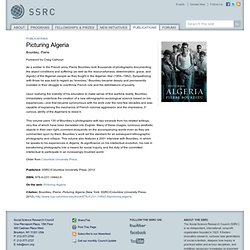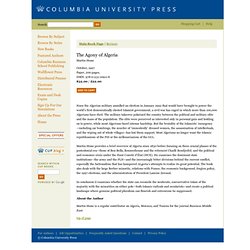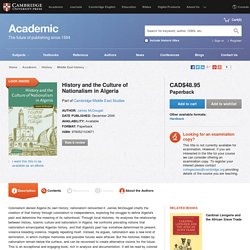

More North African Readings. Picturing Algeria — Publication. Foreword by Craig Calhoun As a soldier in the French army, Pierre Bourdieu took thousands of photographs documenting the abject conditions and suffering (as well as the resourcefulness, determination, grace, and dignity) of the Algerian people as they fought in the Algerian War (1954–1962).

Sympathizing with those he was told to regard as “enemies,” Bourdieu became deeply and permanently invested in their struggle to overthrow French rule and the debilitations of poverty. Upon realizing the inability of his education to make sense of this wartime reality, Bourdieu immediately undertook the creation of a new ethnographic-sociological science based on his experiences—one that became synonymous with his work over the next few decades and was capable of explaining the mechanics of French colonial aggression and the impressive, if curious, ability of the Algerians to resist it. Order from Columbia University Press. The Agony of Algeria. Martin Stone October, 1997 Paper, 200 pages, ISBN: 978-0-231-10911-6 $32.00 / £22.00 Since the Algerian military annulled an election in January 1992 that would have brought to power the world's first democratically elected Islamist government, a civil war has raged in which more than 100,000 Algerians have died.

The military takeover polarized the country between the political and military elite and the mass of the population. The elite were perceived as interested only in personal gain and holding on to power, while most Algerians faced intense hardship. But the brutality of the Islamists' insurgency—including car bombings, the murder of 'immodestly' dressed women, the assassination of intellectuals, and the wiping out of whole villages—has lost them support. Martin Stone is a regular contributor on Algeria, Morocco, and Tunisia for the journal Business Middle East. top of page. Making Algeria French. Oil Wealth and the Poverty of Politics. Managing Instability in Algeria. Review 'This is a superbly crafted study of its fragmented elite; it is as rigorous as the fluid subject matter allows...

This book is a must read for students of comparative politics and political economy as well as Algeria specialists. It offers a thick, rich description of the contradictory values and practices that tend to transform rhetorical reformers into conservative rent-seekers.' - Clement M. Henry, Middle East Journal, Vol. 62, No. 1, Winter 2008 About the Author Isabelle Werenfels is a research associate at the German Institute for International and Security Affairs (SWP), and has lectured at Freie Universität, Berlin.
History and the Culture of Nationalism in Algeria. Colonialism denied Algeria its own history; nationalism reinvented it.

James McDougall charts the creation of that history through colonialism to independence, exploring the struggle to define Algeria's past and determine the meaning of its nationhood. Through local histories, he analyses the relationship between history, Islamic culture and nationalism in Algeria. He confronts prevailing notions that nationalism emancipated Algerian history, and that Algeria's past has somehow determined its present, violence breeding violence, tragedy repeating itself.
Instead, he argues, nationalism was a new kind of domination, in which multiple memories and possible futures were effaced. But the histories hidden by nationalism remain below the surface, and can be recovered to create alternative visions for the future.